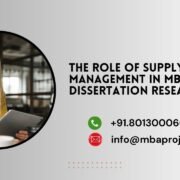The Role of Supply Chain Management in MBA Dissertation Research
The Role of Supply Chain Management in MBA Dissertation Research
Introduction to Supply Chain Management in MBA Research
The Role of Supply Chain Management in MBA Dissertation Research. Supply Chain Management (SCM) is a crucial area of study in MBA dissertation research, as it plays a fundamental role in modern business operations. It encompasses the planning, execution, and control of supply chain activities with the aim of delivering value to consumers and improving operational efficiency. Given the increasing complexity of global markets, SCM is now a key subject in business schools worldwide. This article explores the significance of supply chain management in MBA dissertation research, detailing its impact on businesses, key topics, and methodologies students can utilize for an in-depth academic investigation.
Why Supply Chain Management is Critical in MBA Research
1. Strategic Importance in Global Business
SCM ensures seamless coordination among suppliers, manufacturers, logistics providers, and retailers. Companies like Amazon, Walmart, and Apple have leveraged cutting-edge supply chain strategies to gain a competitive advantage. MBA students focusing on SCM can explore how companies optimize their logistics networks, inventory management, and supplier relationships to enhance efficiency and profitability.
2. Cost Optimization and Efficiency
Businesses invest heavily in supply chain technologies to reduce operational costs. Lean management, Six Sigma, and Just-in-Time (JIT) strategies are crucial areas for research. MBA students can analyze cost-saving measures through case studies of multinational corporations that have successfully optimized their supply chains.
3. Risk Management in Supply Chains
Disruptions in global supply chains, such as those caused by COVID-19, geopolitical tensions, and natural disasters, highlight the need for resilient strategies. Analyzing risk management frameworks, contingency planning, and the role of technology in mitigating risks are essential topics for MBA dissertations.
Key Topics for MBA Dissertations in Supply Chain Management
1. Digital Transformation in Supply Chains
The rise of Artificial Intelligence (AI), Internet of Things (IoT), and Blockchain Technology has revolutionized SCM. MBA students can explore how these technologies improve real-time tracking, transparency, and predictive analytics to enhance decision-making.
2. Sustainable and Green Supply Chain Management
Environmental sustainability is a growing concern, and businesses are shifting towards eco-friendly supply chain practices. Research can focus on how organizations implement green logistics, circular economy models, and carbon footprint reduction strategies to comply with environmental regulations and enhance corporate social responsibility (CSR).
3. E-commerce and Supply Chain Logistics
The boom in e-commerce has reshaped traditional supply chains. Topics for research include last-mile delivery optimization, warehouse automation, drone deliveries, and the impact of omnichannel retailing on SCM.
4. Supplier Relationship Management and Procurement Strategies
Strong supplier relationships are essential for smooth operations. MBA dissertations can examine strategic supplier partnerships, vendor risk management, and procurement negotiation tactics that drive supply chain success.
5. Data-Driven Decision Making in Supply Chains
The use of Big Data, Machine Learning, and predictive analytics enables businesses to anticipate demand fluctuations and optimize inventory. Exploring how data-driven insights improve inventory forecasting, production scheduling, and logistics planning is an insightful research area.
Research Methodologies for MBA Dissertations in Supply Chain Management
1. Case Study Analysis
Students can conduct comparative case studies of companies such as Tesla, Unilever, or DHL to evaluate best practices in supply chain optimization.
2. Quantitative Research
Using statistical models, surveys, and financial data analysis, students can measure supply chain efficiency, cost savings, and risk factors across different industries.
3. Qualitative Research
Interviews with supply chain managers, logistics experts, and procurement officers provide valuable insights into the challenges and strategies employed in real-world SCM scenarios.
4. Simulation and Modeling Techniques
Using software such as SAP, Oracle SCM, or MATLAB, MBA students can simulate supply chain scenarios to assess the impact of policy changes, demand fluctuations, and logistics network optimizations.
Challenges in Supply Chain Management Research
1. Data Availability and Confidentiality
Many companies are reluctant to share proprietary supply chain data, making research challenging. Students can use publicly available reports, industry whitepapers, and government trade databases to supplement their research.
2. Complexity of Global Supply Chains
Understanding the interplay between economic policies, trade regulations, and geopolitical factors requires extensive background knowledge and interdisciplinary study.
3. Technological Adaptation
With rapid technological advancements, keeping up with emerging trends such as AI, automation, and blockchain in supply chain management requires continuous learning.
Future Trends in Supply Chain Management
1. AI and Machine Learning in Predictive Analytics
AI-driven algorithms are improving demand forecasting, route optimization, and inventory planning, reducing costs and increasing efficiency.
2. Blockchain for Supply Chain Transparency
Blockchain ensures secure, tamper-proof transaction records, enhancing trust among supply chain stakeholders and reducing fraud.
3. Circular Economy and Reverse Logistics
Companies are shifting towards sustainable supply chains by recycling, reusing, and refurbishing products to minimize waste and improve resource efficiency.
4. 3D Printing in Manufacturing Supply Chains
3D printing enables on-demand production, reducing dependency on centralized manufacturing hubs and cutting down lead times.
Conclusion
Supply Chain Management is a dynamic and essential field for MBA dissertation research, offering vast opportunities for analysis and innovation. Whether focusing on cost efficiency, risk mitigation, digital transformation, or sustainability, students can contribute valuable insights to the evolving world of supply chain management. By leveraging cutting-edge methodologies and real-world case studies, researchers can provide actionable solutions that drive business success.
Thank you for reading our Blog “The Role of Supply Chain Management in MBA Dissertation Research”.
Also, read our more BLOG here.
For Order “MBA Projects” feel free to contact us at Mob: Call / WhatsApp: +91.8013000664 || Email: info@mbaprojects.net.in













